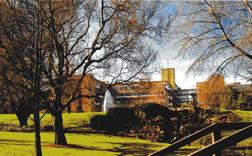Articles from this issue
- A change of name for the Bulletin
- The New Biosciences Federation: A Major Step Forward for Biology
- Special Interest Groups
- Pharmacology at the University of Bristol
- Pharmacology at the University of Surrey
Volumes
Issues
VOLUME 1 - ISSUE 1 - PHARMACOLOGY AT THE UNIVERSITY OF SURREY
The University of Surrey was established on 9 September 1966 with the grant of its Royal Charter, but its roots go back to a late nineteenth century concern to provide greater access to further and higher education for the "poorer inhabitants" of London. This now seems a distant thought for the rich South East town of Guildford in leafy Surrey! The forerunner of the University, The Battersea Polytechnic Institute (founded in 1891) began concentrating on science and technology from about 1920 and taught day and evening students for degrees of London University. Its academic reputation steadily grew to the point in 1956 where it was one of the first colleges to be designated a "college of advanced technology". It was renamed Battersea College of Technology. In 1963 the Robbins Report proposed that Battersea College should expand and become a University awarding its own degrees, and the move to Guildford establishing the University of Surrey, offering sandwich degrees in science and technology, was completed by 1970.
Professor Dennis Parke was appointed as the first Head and Professor of the Department of Biochemisty in October 1967. Dennis brought drug research to Surrey and several early appointments brought expertise in drug metabolism from St Mary’s Hospital Medical School. Throughout the 1970’s this biochemical pharmacology grew to embrace a major research and teaching role in drug toxicology. Dennis built a large and unique department and the BPS last came to Guildford in 1978. At that time the pharmacology at Surrey was very much drug metabolism and toxicology, with more involvement in the British Toxicology Society than with the BPS. Surrey has a long history of international recognition for its Toxicology research led by Professors Laurie King, Gordon Gibson and Peter Goldfarb. In addition, our undergraduate and Master’s courses in Toxicology have had world-renowned success for over 20 years.
 In 1981, Ian Kitchen was appointed as the first "card carrying" pharmacologist and he brought traditional pharmacology to Surrey from his background at Chelsea College (now King’s) and the London Hospital Medical School. Since that time pharmacology at Surrey has grown, with more academic staff, a designated Pharmacology Research Group and degree variants of our Biochemistry programmes in both Pharmacology and Neuroscience. In the 1980’s Nursing was also part of the Biochemistry department and we taught the only honours degree in Nursing with a Pharmacology specialisation. Several of these graduates went on to do PhDs in Pharmacology. In 1992, Biological Sciences at Surrey was reviewed and the Reece Report recommended the establishment of a larger School of Biological Sciences embracing Biochemistry, Pharmacology, Toxicology, Nutrition, Endocrinology, Food Science and Microbiology. The bringing together of many subject disciplines has undoubtedly been a great success and Pharmacology at Surrey formed part of a single RAE submission in 2001 of over 65 academic staff and achieved a 5* rating. Pharmacology and Toxicology also gained a 5 rating in the 1996 exercise.
In 1981, Ian Kitchen was appointed as the first "card carrying" pharmacologist and he brought traditional pharmacology to Surrey from his background at Chelsea College (now King’s) and the London Hospital Medical School. Since that time pharmacology at Surrey has grown, with more academic staff, a designated Pharmacology Research Group and degree variants of our Biochemistry programmes in both Pharmacology and Neuroscience. In the 1980’s Nursing was also part of the Biochemistry department and we taught the only honours degree in Nursing with a Pharmacology specialisation. Several of these graduates went on to do PhDs in Pharmacology. In 1992, Biological Sciences at Surrey was reviewed and the Reece Report recommended the establishment of a larger School of Biological Sciences embracing Biochemistry, Pharmacology, Toxicology, Nutrition, Endocrinology, Food Science and Microbiology. The bringing together of many subject disciplines has undoubtedly been a great success and Pharmacology at Surrey formed part of a single RAE submission in 2001 of over 65 academic staff and achieved a 5* rating. Pharmacology and Toxicology also gained a 5 rating in the 1996 exercise.
Pharmacology and Neuroscience is very much a strong part of the, now named, School of Biomedical and Life Sciences, with Professors of Pharmacology, Neuropharmacology, Psychopharmacology and Pharmacoepidemiology. Embedded in the School is the Human Psychopharmacology Research Unit led by Professor Ian Hindmarch, which adds a further clinical dimension to Pharmacology at Surrey. Throughout the last 20 years our links with the pharmaceutical industry (which have always been strong because of our emphasis on Sandwich courses at Surrey) have grown and two of the three symposia at the BPS meeting in June have industry sponsors. The topics reflect some of the research interests in the School, including our continued strength in the area of genomics and toxicology. The human dimension of the School’s research is reflected in the cardiovascular symposium, whilst the current focus on genes and addiction makes up the third symposium topic.
Members of the Pharmacology group have always been enthusiastic about BPS meetings and our students have always been encouraged to present their research. In addition Surrey has been actively involved in editing the British Journal of Pharmacology (1 present and 2 past editors). It is a great honour to welcome back the BPS after 25 years and we look forward to seeing many of our colleagues in Pharmacology. The campus is a great place for a conference, and our postgrads and postdocs will be sporting limited-edition BPS Surrey T-shirts and ensuring you are looked after!
Ian Kitchen
